- News
- Reviews
- Bikes
- Accessories
- Accessories - misc
- Computer mounts
- Bags
- Bar ends
- Bike bags & cases
- Bottle cages
- Bottles
- Cameras
- Car racks
- Child seats
- Computers
- Glasses
- GPS units
- Helmets
- Lights - front
- Lights - rear
- Lights - sets
- Locks
- Mirrors
- Mudguards
- Racks
- Pumps & CO2 inflators
- Puncture kits
- Reflectives
- Smart watches
- Stands and racks
- Trailers
- Clothing
- Components
- Bar tape & grips
- Bottom brackets
- Brake & gear cables
- Brake & STI levers
- Brake pads & spares
- Brakes
- Cassettes & freewheels
- Chains
- Chainsets & chainrings
- Derailleurs - front
- Derailleurs - rear
- Forks
- Gear levers & shifters
- Groupsets
- Handlebars & extensions
- Headsets
- Hubs
- Inner tubes
- Pedals
- Quick releases & skewers
- Saddles
- Seatposts
- Stems
- Wheels
- Tyres
- Health, fitness and nutrition
- Tools and workshop
- Miscellaneous
- Buyers Guides
- Features
- Forum
- Recommends
- Podcast
feature
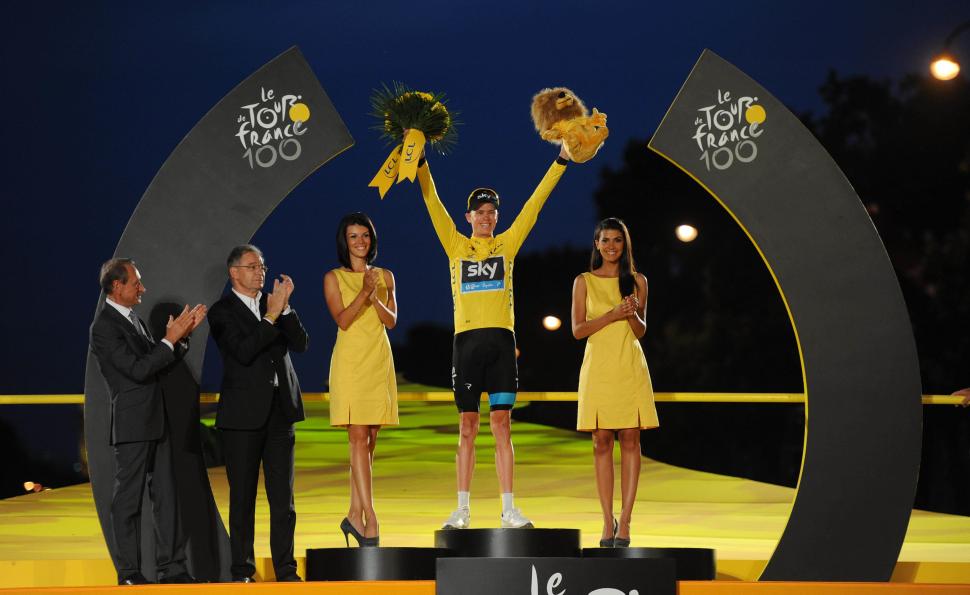 Chris Froome celebrates winning the 2013 Tour de France (picture copyright Simon Wilkinson:SWpix.com)
Chris Froome celebrates winning the 2013 Tour de France (picture copyright Simon Wilkinson:SWpix.com)Tour de France 2014 preview - our stage-by-stage guide to the race + bonus video preview of Yorkshire stages
Last time the Tour de France began in Britain, with the London Grand Départ in 2007, no-one could have imagined it would return to the UK just seven years later, and what’s more with the last two editions won by British riders on a British team. Yet here we are, with Yorkshire hosting the opening two days of the race this weekend as Chris Froome looks to defend his crown. Here’s our stage-by-stage preview to take you all the way from Leeds to Paris. Plus two bonus video previews of stages 1 and 2 with GCN's Dan Lloyd and Matt Stephens riding the routes.
It’s billed as the toughest Grand Départ in 40 years, and certainly Stage 2 in particular poses plenty of potential pitfalls, and in the opening week Stage 5 over some of the Paris-Roubaix cobbles could also catch out the unwary.
The first big mountain stages come in the Vosges on the second weekend, then there’s a brief visit to the Alps before the race heads across the Midi towards three potentially decisive Pyrenean stages followed by the sole individual time trial in this year’s race, then the finale in Paris.
You can find more details on all the stages, including timings, profiles of individual climbs and zoomable maps – in 2D and, if you have the Google Earth, 3D – on the Tour de France website.
Stage 1: Leeds – Harrogate (190.5km)
Saturday 5 July
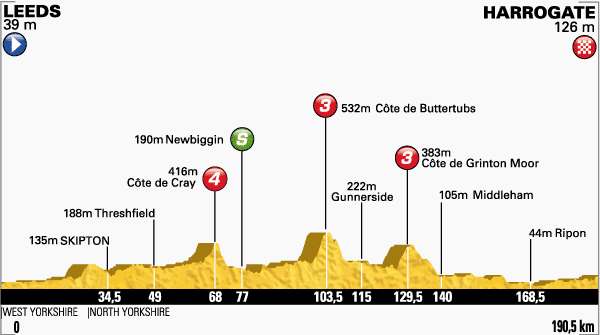

The 101st edition of the world’s biggest annual sporting event starts with a stage in Yorkshire that many expect to finish with a bunch sprint, with the likes of Mark Cavendish, Marcel Kittel, André Greipel and Peter Sagan fighting it out for the right to be the first wearer of the race leader’s yellow jersey this year.
There are three climbs to be negotiated in the Yorkshire Dales today including the Buttertubs Pass but the sprinters teams will work hard to bring back the day’s break – and none more so than Omega Pharma-Quick Step, working for Cavendish, whose mother was born in Harrogate and has made this stage his big target for 2014.
Stage 2: York – Sheffield (201km)
Sunday 6 July


Yorkshire’s Grand Départ has been described as the toughest start to the Tour de France in four decades – and that’s largely down to this stage, which is being compared to the oldest of cycling’s one-day classic races, Liège-Bastogne-Liège, with nine categorised climbs to be negotiated. An unfortunately timed puncture or crash could cost some of the overall contenders dear here.
The last of the day’s climbs, Jenkin Road in Sheffield, is one of the shortest but it has a gradient of one in three at one point; some will be dreading it, others eyeing it as an opportunity for a late attack. This isn’t a day for a sprint finish, and it’s almost certain the race lead will change hands.
https://www.youtube.com/watch?v=De5hf1DugDw&index=3&list=PLUdAMlZtaV11xU...
Stage 3: Cambridge – London (155km)
Monday 7 July


The final stage before the race heads across the Channel is a short one, and without the types of climbs seen in the past two days. As a result, it’s a virtual certainty that it will come down to a sprint finish on The Mall in front of Buckingham Palace. Mark Cavendish was thwarted in his Olympic ambitions here in 2012, but won the test event the previous year.
The flatter stages of the Tour, particularly in the first week or so, tend to follow a set pattern. Perhaps three or four riders will form a break, and the sprinters’ teams will control the gap before reeling them in. Today, it’s very unlikely they will stay clear, but they will have got their team sponsors some valuable TV exposure.
Stage 4: Le Touquet-Paris Plage – Lille Métropole (163.5km)
Tuesday 8 July


The Tour returns to French soil for the start of a stage that also takes the race across the Belgian border and should see a second successive sprint finish. There are two categorised climbs today, but neither are particularly taxing and the second one comes with more than 40 kilometres still to ride.
Again, the sprinters’ teams will look to keep the day’s break on a reasonably tight leash and bring it back perhaps 10 kilometres remaining as they start jostling for position on the road. The opening week of the race is always fraught, however, and a nervous peloton means that crashes often happen towards the end of stages such as this.
Stage 5: Ypres – Arenberg Porte de Hainault (155.5km)
Wednesday 9 July
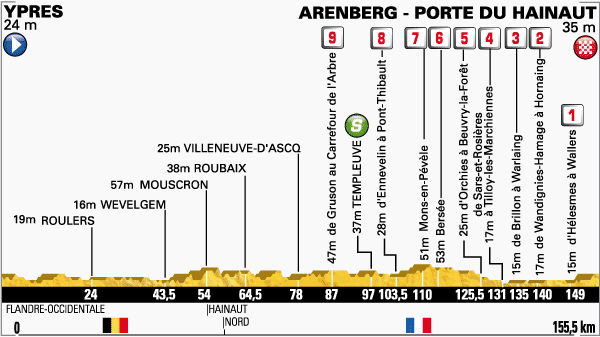
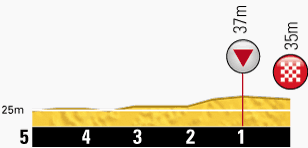
This stage, which includes 15 kilometres of cobbled roads that feature in the Paris-Roubaix one-day race, is one of the most eagerly anticipated of the 101st edition of the Tour de France – but it’s also one that some riders will be dreading, and it is entirely likely that at least one of the overall contenders’ campaigns will come to a premature end today.
For the men fighting for the yellow jersey, it’s a day to survive and try not to lose time on rivals. Over the cobbled sections, the race will split apart into small groups, and the riders who contest the stage one will almost certainly be ones who excel in the spring classics. Riding here in July, rather than April creates its own issues though – if it’s a dry day, riders will have to deal with clouds of dust.
Stage 6: Arras – Reims (194km)
Thursday 10 July


Like yesterday’s stage, this one commemorates some of the sites of the First World War, including the area where the Battle of the Somme was fought. It should be another day for the sprinters, although the finish is reasonably tough and could favour a powerful rider such as Peter Sagan or André Greipel.
If it’s windy today, as often happens in this part of France, there is an added danger for the riders targeting the overall, since a twisting route means the race may break up into small groups – and as happened to Movistar’s Alejandro Valverde last year, for example, if you miss out on being in the front one you can lose a lot of time, as well as your hopes of winning the race.
Stage 7: Épernay – Nancy (234.5km)
Friday 11 July


A reasonably flat stage, but two climbs late on means it’s far from certain that the sprinters will prevail, and even if it does come down to a bunch finish, it’s entirely possible that some of them will have been distanced on the final climb, which comes 5 kilometres from the end,
With an average gradient of 7.8 per cent over its 1.3 kilometre length, the last ascent of the day is also the perfect place for a strong rider to launch an attack and hope to gain enough of an advantage to stay clear until the line on a fast downhill finish into Nancy.
Stage 8: Tomblaine – Gérardmer La Mauselaine (161km)
Saturday 12 July


The second Saturday of the race sees it head into the mountains for the first time, in this case the Vosges, with three categorised climbs late on including a summit finish following a climb of 1.8 kilometres at an average gradient of 10.3 per cent.
With two tougher stages in the days ahead, this is one where members of the break, or a late lone attacker, may prevail, while the teams of riders with ambitions for the overall victory will keep a close eye on their rivals and seek to control the pace at the front of the main group.
Stage 9: Gérardmer – Mulhouse (170km)
Sunday 13 July


A tough day, with six categorised climbs, the toughest being the penultimate one, Le Markstein, a 10.8 kilometre ascent that has an average gradient of 5.4 per cent. In the Vosges, the climbs tend to be steady rather than steep, but nonetheless it’s a stage that will sap the strength from many riders’ legs.
With the last climb of the stage, the Grand Ballon, coming more than 40 kilometres from the finish and a flat final 20 kilometres ahead of the line in Mulhouse, it’s not really a day for attacks from the overall contenders, but it is one on which a rider who is struggling could lose time to his rivals.
Stage 10: Mulhouse – La Planche des Belles Filles
Monday 14 July


The most difficult stage yet of the race, with three Category 1 ascents including a summit finish, falls on Bastille Day, and it is certain that riders from French teams will go on the attack with hopes of securing what could be a career defining victory, but it’s more likely to be the overall challengers who fight it out.
It’s only the second time the Tour has finished at La Planche des Belles Filles, a 5.9 kilometre climb at an average gradient of 8.5 per cent. On the previous occasion, in 2012, Team Sky forced a blistering pace on the climb, Chris Froome winning the stage, and Bradley Wiggins got into the yellow jersey. Teams such as Alberto Contador’s Tinkoff-Saxo will be looking to thwart their plans this time.
Tuesday 15 July – Rest Day
Stage 11: Besançon – Oyonnax (187.5km)
Wednesday 16 July


The race resumes with the first of two transitional stages ahead of the Alps, and they are ones that could see a break stay away. With the race entering its second half, there will be pressure on some teams that haven’t got much out of the race to date to get men into the escape.
There are a number of climbs on today’s route, but only four of them – all inside the final 50 kilometres – count for points in the mountains competition. After the last of those, there is a kick up Lac Genin, a potential location for a late attack with 15 kilometres mainly downhill to the finish.
Stage 12: Bourg-en-Bresse – Saint-Étienne (185.5km)
Thursday 17 July


Today’s climbs are a bit more spread out than yesterday’s, the last coming a little more than 20 kilometres from the finish. It’s 9.8 kilometres long, but the average gradient is a gentle 2.9 per cent, and the sprinters will be looking to get over it with the day’s breakaway riders in their sights.
By this point in the race, it should be clear who is in contention for the green points jersey, won for the past two years by Peter Sagan, whose Cannondale team will be looking at this type of stage to put his rivals into trouble on that last ascent to drop them from the group and strengthen his defence of his title.
Stage 13: Saint-Étienne – Chamrousse (197.5km)
Friday 18 July


Today’s first Alpine stage finishes at the first Hors-Catégorie – literally, “beyond classification” – summit of this year’s race at Chamrousse, and that means the focus shifts once more to the men with ambitions of winning the overall title. The preceding climb of the Col de Palaquit will thin out the bunch before the final, 18.2 kilometre climb at an average gradient of 7.3 per cent.
With little more than a week’s racing left, we’ll know the men who will be fighting it out for the yellow jersey, and which have fallen out of contention, perhaps as a result of a crash or some other mishap earlier in the race. This is the kind of day where they can look at rescuing something from their Tour by trying to slip into the break and go for a stage win.
Stage 14: Grenoble – Risoul (177km)
Saturday 19 July


There could be a bit of a fight to get into the break on today’s stage – it includes the Col d’Izoard, one of the Tour’s most famous climbs and at 2,360 metres the highest point of this year’s race, meaning there is a bonus on offer for the first rider to crest it.
Another summit finish, with the climb to Risoul making its debut in the race, means that it’s another potentially significant day for the overall standings. The sprinters, meanwhile, will be looking to finish the stage inside the time limit ahead of getting back to business tomorrow.
Stage 15: Tallard – Nîmes (222km)
Sunday 20 July
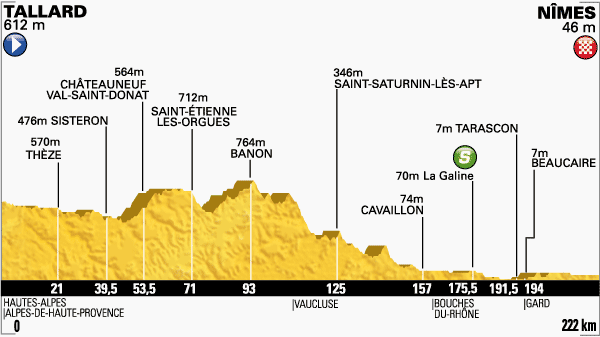

There are no categorised climbs today, and as the Tour heads out of the Alps it’s more than likely the stage will come down to a sprint finish in Nîmes, with just a week left until the finale in Paris and opportunities starting to dwindle to pick up points for those with hopes of the green jersey.
If a wind starts blowing across from the Camargue in the latter part of the stage, however, a sprint finish may not be a foregone conclusion – it could cause the peloton to split, and small groups known as echelons to form on the road. Overall contenders and sprinters alike will want to keep near the front to minimise the risk.
Monday 21 July – Rest Day
Stage 16: Carcassonne – Bagnères-de-Luchon (237.5km)
Tuesday 22 July

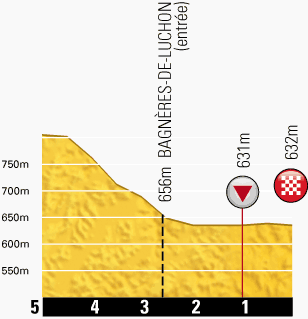
The business end of the Tour starts with the longest stage of the race and the first of three in the Pyrenees that will help determine who will stand on the top step of the podium on the Champs-Élysees on Sunday. With no summit finish today, this could be one for the break.
There are three Pyrenean passes to be negotiated, the last of them being the Port de Balès, where Andy Schleck lost the yellow jersey to Alberto Contador in 2011 when he shipped his chain – proof that a crash or mechanical incident at the wrong time can have a huge influence. Schleck would later be awarded the overall win due to the Spaniard’s doping ban.
Stage 17: Saint-Gaudens – Saint-Lary Pla d’Adet (124.5km)
Wednesday 23 July


With four big climbs today, the last of them 10.2 kilometres in length and averaging 8.3 per cent ahead of a summit finish, this may not be the day the Tour is won, but it can certainly be one where it is lost of one of the challengers suffers an off day.
The sprinters’ teams are unlikely to let an early break go, with the day’s intermediate sprint giving an opportunity for points ahead of the climbing starting just before the 50 kilometres mark. At that point, contenders for the mountains competition will look to get away with plenty of points up for grabs, but the final climb is likely to be contested by the overall challengers.
Stage 18: Pau – Hautacam (145.5km)
Thursday 24 July

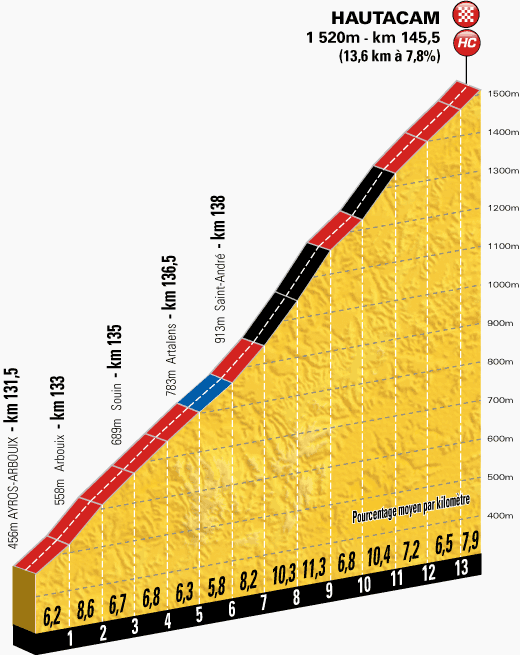
The final mountain stage of the race includes one of the most feared climbs in cycling, the Col du Tourmalet, and it’s a monster, topping out at 2,115 metres. Once again, there’s a prize on offer for the first man over the top, which comes exactly 50 kilometres from the finish.
The teams of the overall contenders will seek to take control on the 13.6 kilometre final climb to Hautacam, which other than Saturday’s individual time trial represents the last chance to steal seconds on rivals – and for riders who are weaker against the clock, today is their final throw of the dice, so it could be an explosive finish.
Stage 19: Maubourguet – Bergerac (208.5km)
Friday 25 July


On paper this should be a day when the sprinters – assuming they have all made it through the Pyrenees without missing the time limit and thereby find themselves eliminated from the race – contest the stage finish, with the day’s only categorised climb, 13 kilometres from the finish, not representing a significant obstacle.
In practice, it may not turn out that way, since today is the last chance for a rider from the break or a solo attacker to clinch a stage win, and riders from teams with slim pickings from the Tour so far will be under strict orders to go on the offensive today to try and rescue something from the race.
Stage 20: Bergerac – Périgueux (54km individual time trial)
Saturday 26 July


The only time trial stage of the 101st Tour de France comes on the penultimate day. For the stronger riders against the clock, such as Chris Froome and Alberto Contador, it’s a chance to gain time over their rivals who are weaker at the discipline. For others, it’s a stage to try and limit their losses. It’s likely there will be a final reshuffling of the General Classification today.
Besides those vying for the overall victory, this is also a day that cycling’s time trial specialists will have circled in red on the calendar since the route was announced – and none more so than multiple world champions at the discipline, Trek Factory Racing’s Fabian Cancellara and Tony Martin of Omega Pharma-Quick Step.
Stage 21: Évry – Paris Champs Élysées (137.5km)
Sunday 27 July


The final stage of the Tour de France is for most riders a day of celebration. On the way into Paris, Champagne will be drunk, photos will be posed for, and the team of the winner-in-waiting will lead the race onto the closing circuit in the heart of the French capital. Once there, however, things will become more serious, especially for the sprinters.
Winning on the Champs Élysées is every sprinter’s dream. Until 12 months ago, Mark Cavendish had never been beaten here, winning the last stage four years in a row. Marcel Kittel prevented him from making it five by the narrowest of margins. At the end of nine laps of the Champs Élysées circuit, it will be a hard fought sprint, especially if the points jersey hasn’t yet been decided.
All stage profiles copyright ASO
Simon joined road.cc as news editor in 2009 and is now the site’s community editor, acting as a link between the team producing the content and our readers. A law and languages graduate, published translator and former retail analyst, he has reported on issues as diverse as cycling-related court cases, anti-doping investigations, the latest developments in the bike industry and the sport’s biggest races. Now back in London full-time after 15 years living in Oxford and Cambridge, he loves cycling along the Thames but misses having his former riding buddy, Elodie the miniature schnauzer, in the basket in front of him.
A more appropriate punishment:...
By no means claiming that Armstrong was the only doper in that period but your claim makes no sense: the average speed is taken on the time of the...
Close passing and rank bad driving have almost become the norm, to the point where I expect it and it doesn't shock me. What does shock me are the...
Furious residents claim they have been blocked in their driveways after a council installed 'ridiculous' cycling wands along a new bike lane....
So why did they not make the bridge wider, one side for cyclists and the other for pedestrians with a partition in between?
I suffered a close pass by a BMW driver 2 or 3 years ago. 10 yards later he was stopped by temporary lights. It's all on video: there's no swearing...
Electromagnetic pedals you say? Call the witch finder general!
I lived in Swansea before and after the new tracks were installed, and cycled along the Mayals Rd a couple of times each week. I'm sorry to say...
Ok, so now the trial has proven successful and useful it should be introduced on a compulsory basis for all driving instructors surely?
If a chain fell between the spokes and the cassette, it's a set up issue not the feckin chain 🙄